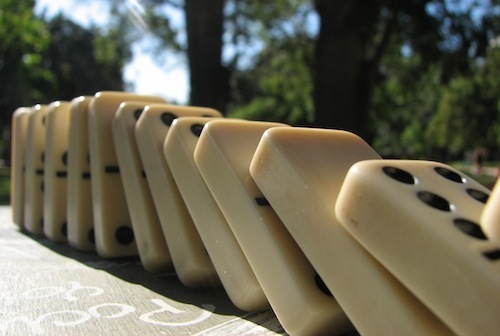Joshua Becker's Blog, page 150
March 14, 2011
The Domino Effect of Simple Living
Editor's Note: This is a guest post by Faith Janes of Minimalist at Home.
"Change begets change." - Charles Dickens
Living simply is not very simple at all in the beginning. Making tough decisions and staying motivated is a big challenge. If you stay focused and keep making an effort, you'll find that each step that follows comes more easily than the one before.
Simple living is the absence of excess. Many consider minimalism and simple living to be focused on possessions. While that is a very practical starting point, the decision to eliminate excess will naturally spill over into other areas of life.
Eliminating excess possessions leads to a decluttered home.
Eliminating outside obligations leads to a calmer schedule and more family time.
Eliminating poor eating habits leads to healthier living.
Eliminating mindless spending leads to escaping debt and building a better financial future.
Simple living does not imply simple choices. It requires a level of awareness grounded in your personal values. You must establish your priorities and judge each choice to be made according to those priorities. As you begin to ask yourself why something is important to you you'll become more aware of why you make certain choices. That greater sense of awareness will give you a guide to measure all of your future decisions.
Pretty soon simplicity becomes second nature. The domino effect of simple living takes over and you'll be amazed where it can lead.
Cleaning out your closets –> leads to utilizing a smaller wardrobe more effectively
Using a smaller wardrobe more effectively –> leads to making fewer purchases
Making fewer purchases –> leads to saving more of your money
Saving more of your money –> leads to getting out of debt
Getting out of debt –> leads to less financial stress
Less financial stress –> leads to greater personal freedom
Greater personal freedom –> leads to more time to pursue your dreams
Time to pursue your dreams –> leads to increased happiness and personal fulfillment.
In some circumstances, the domino effect will lead to personal change. At other times, the effects will radiate outward and touch the lives of those around you.
A single domino or a single decision may not seem impressive by itself. But combined with the next and then the next, the effect can be life changing.
***
Faith is the author of the brand new e-book, Family-Sized Minimalism. She writes about pursuing Less Mess . . . More Life through minimalism at Minimalist at Home.
March 8, 2011
Living for Others
"The best way to find yourself is to lose yourself in the service of others." - Mohandas Gandhi
We are far too easily fooled.
You see, many will try to define success, greatness, and happiness in terms of winning out over others, having power over others, and having the ability to dominate others. The lust for power is common and widespread in humans – the power to order others around, the power to make decisions that will impact others, and the power to own when others cannot.
Many see the world in the form of a pyramid with the ones on the bottom serving those on the top. And people long for that top spot because the world promises joy to those who sit there. Success, greatness, and happiness is found there… in winning out over others.
But what if that thinking is all wrong? What if true happiness is not found in lording authority over others – but instead, is found in living our lives for others? What if choosing to serve others was actually the pathway to true success and lastness greatness?
What if, by living for others…
we become more fulfilled, more complete?
we find true happiness?
we find the meaning of life?
we become bigger than ourselves?
we sleep better at night?
we give back to those who served us?
we make (and leave) the world a better place?
we find less stress and less frustration?
we find greater relationships?
we experience real love?
we receive far more than we give?
we find a pursuit greater than the material things around us?
If that were the case, it would certainly change everything… wouldn't it?
March 4, 2011
15 Clutter Busting Routines For Any Family
Almost three years ago, my family and I decided to start living a minimalist life. Since then, we have tried to remove all of the possessions from our home that are not essential. In doing so, we have found new opportunity to spend our time, energy, and finances on the things that are most important to us.
Also, we became far more observant about how our things rob us of our precious freedom. We have learned that just like most families, no matter how hard we try to stop it, stuff inevitably continues to enter our home… nearly every single day. And so we work hard to remove any clutter that begins to accumulate in our home. Along the way, we have picked up (and try to practice) some helpful clutter busting routines.
Here are 15 Clutter Busting Routines that we have found particularly helpful in our home.
1. Place junk mail immediately into a recycling bin. Take note of the natural flow of mail into your home. Placing a recycling container prior to your "mail drop-off zone" can catch most of that junk mail before it even reaches your counter. And as an added bonus, you'll begin to look through less of it too (think advertisements).
2. Store kitchen appliances out of sight. Toasters, can openers, coffee makers… they all take up space. And while it may not seem like much space by looking at them, the first time you prepare dinner on a counter without them present, you'll quickly notice the difference. If you think it's going to be a hassle putting them away every morning, don't. It takes less than 6 seconds to put each appliance away… once you've found a home for it that is.
3. Remove 10 articles of clothing from your closet today. Go ahead. If you are typical, it'll take you roughly 5 minutes to grab 10 articles of clothing that you no longer wear and throw them in a box. Your remaining clothes will fit better in your closet. Your closet will be able to breathe again. And if you write "Goodwill" on the box when you are done, you'll feel better about yourself as soon as you drop it off. Most likely, you'll find yourself inspired to do it again.
4. Fold clean clothes / Remove dirty clothes immediately. The way I handle clothes these days is one of the biggest clutter changes I have made in my life. Unfortunately, I used to be a "throw-them-on-the-floor" guy. But now I handle each one right when I take it off. Dirty clothes down the clothes chute. Clean clothes back to the hanger or drawer. That's it. It's really that simple. How do the dirty ones magically appear clean and folded in my closet you ask… I'm not sure. You'll need to ask my wife.
5. Kids' bedroom toys live in the closet. Not on the floor. Not on the dresser. But in the closet. And when the closet gets too full of toys, it's time to make some room. Hint, it's usually safe to remove the toys at the bottom of the pile.
6. Kids pick up their toys each evening. This has countless benefits: 1) It teaches responsibility. 2) It helps kids realize that more isn't always better. 3) The home is clean for mom and dad when the kids are in bed. 4) It's a clear indication that the day has come to an end. Gosh, you'd think with all these benefits it would be easier for us to get the kids to do it…
7. Fill your containers for the garbage man. Use every trash pick-up day as an excuse to fill your recycling containers and/or garbage cans. Grab a box of old junk from the attic… old toys from the toy room… old food from the pantry… old paperwork from the office. If once a week is too often, do this exercise every other week. You'll get the hang of it. And may even begin to enjoy trash morning… okay, I won't go that far.
8. Halve decorations. No seriously, I mean it. Grab a box and walk through your living room. Remove decorations from shelves, tables, and walls that aren't absolutely beautiful or meaningful. You may like it better than you think. If not, you can always put them back. But I'd bet my wife's old high school yearbooks that you won't return all of them.
9. Wash dishes right away. Hand washing some dishes takes less time than putting them in the dishwasher. This applies to cups, breakfast bowls, dinner plates, and silverware. If hand washed right after eating, it takes hardly any time at all. If however, hand washing is just not an option for you, be sure to put used dished in the dishwasher right away. Nobody likes walking into a kitchen with dishes piled up in the sink or on the counter… and it's even less fun eating in there.
10. Unmix and match cups, bowls, plates, and silverware. Uniformity makes for better stacking, storing, and accessing. If there is a souvenir cup or mug that is so important to you that you can't live without it, that's perfectly fine. Just don't keep 5 of them. Mom, any chance you are reading this?
11. Keep your desk clear and clean. Drawers can adequately house most of the things needed to keep your desk functional. And a simple filing system should keep it clear of paper clutter. The next person who sits down to use the desk will thank you.
12. Store your media out of sight. Make a home for dvd's, cd's, video games, and remote controls. They don't need to be in eyesight, you use them less than you think. And if you remove them from your eyesight… maybe you'll use them even less.
13. Always leave room in your coat closet. There are two reasons why coats, shoes, and outerwear keep ending up scattered throughout your home rather than in your closet. The first reason is because your coat closet is so full, it's a hassle to put things away and retrieve them quickly. Leave room on the floor, on the hangers, and on the shelves for used items to be quickly put away and retrieved. The second reason is because you have kids… but you're on your own with that one.
14. Keep flat surfaces clear. Kitchen counters, bathroom counters, bedroom dressers, tabletops… After you clear them the first time, keeping them clean takes daily effort. Receipts, coins, and paper clutter just keep coming and coming… it's just easier the second time around.
15. Finish a magazine or newspaper. Process or recycle immediately. If you've finished the paper product, process it and rid yourself of its clutter immediately. Good recipe in there? Put it in your recipe box and recycle the rest. Good article that your husband will enjoy? Clip it and recycle. Article that your friend will enjoy? Clip it, mail it, and recycle (or better yet, search for it online and send it that way). Coupon too good to pass up? Cut it out and recycle. Stacks of magazines and newspapers serve little purpose in life but to clutter a room.


February 26, 2011
How to Fulfill Dreams
"Keep your dreams alive. Understand to achieve anything requires faith and belief in yourself, vision, hard work, determination, and dedication. Remember all things are possible for those who believe." - Gail Devers
This past week (February 22) marked the one year anniversary of our e-book's launch. Over the past year, Simplify. 7 Guiding Principles to Anyone Declutter Their Home and Life has sold over 2,600 copies and it continues to sell every single day. Its launch was truly a life-changing experience.
And it continues to be the evidence of a dream fulfilled.
For nearly 35 years of my life, I wanted to write a book… to be an author. Selfishly, I wanted the pride that I associated with having my name written on a book's cover. Unselfishly, I wanted to provide valuable inspiration to others… in a form that could far outlive me.
And given the fact that I wanted to write a book that people actually read, Simplify has indeed become the tangible realization of a lifelong dream. Actually, this past year has been defined by the fulfillment of a number of lifelong dreams:
Dream: Spend more time with my family. Accomplished by finding minimalism.
Dream: Write a book. Accomplished in February, 2010. Again in August, 2010.
Dream: Run a marathon. Finished in May, 2010. Time: 4:31.
Dream: Save Financial Emergency Fund: Accomplished in November, 2010.
I've discovered over the past year that dreams come in all shapes and sizes. But their fulfillment is almost always found in the same 7 steps…
1. Select a dream to fulfill. Some of us have so many dreams swirling in our minds, we don't know where to start… while others of us are unable to put our finger on even one. Whether the decision be to write a book, run a marathon, buy a home, or find true love, fulfillment always starts with the intentional identification of one single goal and the heartfelt conviction to accomplish it. Take some time. Pick one. And then, set out to accomplish it.
2. Believe it is achievable. Unfortunately, too many people will never accomplish their dreams because they simply refuse to believe in themselves. Optimism is absolutely required for dream fulfillment and life enjoyment. If you don't have natural self-confidence, make finding it your first dream to accomplish. I suggest, "How to Believe in Yourself: A Four Step Plan." If you do have self-confidence, begin to specifically direct it towards your chosen goal.
3. Ask for help. People have gone before you. Learn as much as you can from them. When I decided to run a marathon, I read How to Run Your First Marathon and talked to my co-worker Carole almost every single week. When I decided to write an ebook, I talked to Jeramiah (technology), Martha (editing), and Jana (title/outline). Each had information that I needed and played a significant role in helping me accomplish my dreams. Don't let your pride be the one obstacle that keeps you from them. Instead, humble yourself and ask for help.
4. Adjust your life as necessary. By definition, if you have not accomplished your dream yet, you'll need to adjust your lifestyle to accomplish it. And while some of the adjustments may be major, they always start small:
Running a marathon starts with running one mile.
Writing a book starts with deciding on a subject.
Clearing your home of clutter starts with cleaning one drawer, closet, or room.
Losing 50 pounds starts with changing one meal.
Buying a home starts with saving one dollar.
Fulfilling your dreams will require you to change your lifestyle – one small step at a time. And while there may be a large number of steps to take, the good news is that the first one is completely achievable… and so is the second…
5. Set a deadline. Deadlines force our hand and call us to action. Therefore, it is absolutely essential to pick a realistic timeline and get moving. Buy a home in the next 3 years. Fix your marriage in the next year. Lose 20 pounds in the next 6 months. Or start a blog in the next 30 days. Find a calendar, a red marker, and a day. Go ahead, circle it. After all, a dream without a deadline is just a wish.
6. Tell others. I have found limitless encouragement by sharing my dreams with others. The number of people cheering for me automatically doubles. Soon, it triples. Suddenly, I'm not just trying to let myself down, but I'm trying to not let my friends down as well. And the cost of failure has just increased.
7. Stay focused. By nature, dreams will require perseverance. There will be successes and failures along the way. Those who persevere through the failures will accomplish their dreams. Those who give up will return to step #1. And if you've gotten this far, why would you want to start over? Instead of allowing failures to kill your dreams, use them to refocus you and your resolve.
On a side note, I realize all too well that the circumstances of life ebb and flow. I humbly recognize that the positive circumstances of my life this past year have allowed these to dreams to be accomplished. One major illness, accident, or misstep could have derailed any of them listed above. If you currently find the circumstances of life derailing you from reaching your dreams, let me encourage you. Don't lose hope. Just redirect your dreams.
In the comment section, I'd be interested to hear if you can specifically identify with any of these seven steps. Are their goals in your life that you are working to accomplish? If so, what are they? And which of the steps above are you currently working towards?


How to Fulfill Dreams (Thoughts on an Ebook's Anniversary)
"Keep your dreams alive. Understand to achieve anything requires faith and belief in yourself, vision, hard work, determination, and dedication. Remember all things are possible for those who believe." - Gail Devers
This past week (February 22) marked the one year anniversary of our e-book's launch. Over the past year, Simplify. 7 Guiding Principles to Anyone Declutter Their Home and Life has sold over 2,600 copies and it continues to sell every single day. Its launch was truly a life-changing experience.
And it continues to be the evidence of a dream fulfilled.
For nearly 35 years of my life, I wanted to write a book… to be an author. Selfishly, I wanted the pride that I associated with having my name written on a book's cover. Unselfishly, I wanted to provide valuable inspiration to others… in a form that could far outlive me.
And given the fact that I wanted to write a book that people actually read, Simplify has indeed become the tangible realization of a lifelong dream. Actually, this past year has been defined by the fulfillment of a number of lifelong dreams:
Dream: Spend more time with my family. Accomplished by finding minimalism.
Dream: Write a book. Accomplished in February, 2010. Again in August, 2010.
Dream: Run a marathon. Finished in May, 2010. Time: 4:31.
Dream: Save Financial Emergency Fund: Accomplished in November, 2010.
I've discovered over the past year that dreams come in all shapes and sizes. But their fulfillment is almost always found in the same 7 steps…
1. Select a dream to fulfill. Some of us have so many dreams swirling in our minds, we don't know where to start… while others of us are unable to put our finger on even one. Whether the decision be to write a book, run a marathon, buy a home, or find true love, fulfillment always starts with the intentional identification of one single goal and the heartfelt conviction to accomplish it. Take some time. Pick one. And then, set out to accomplish it.
2. Believe it is achievable. Unfortunately, too many people will never accomplish their dreams because they simply refuse to believe in themselves. Optimism is absolutely required for dream fulfillment and life enjoyment. If you don't have natural self-confidence, make finding it your first dream to accomplish. I suggest, "How to Believe in Yourself: A Four Step Plan." If you do have self-confidence, begin to specifically direct it towards your chosen goal.
3. Ask for help. People have gone before you. Learn as much as you can from them. When I decided to run a marathon, I read How to Run Your First Marathon and talked to my co-worker Carole almost every single week. When I decided to write an ebook, I talked to Jeramiah (technology), Martha (editing), and Jana (title/outline). Each had information that I needed and played a significant role in helping me accomplish my dreams. Don't let your pride be the one obstacle that keeps you from them. Instead, humble yourself and ask for help.
4. Adjust your life as necessary. By definition, if you have not accomplished your dream yet, you'll need to adjust your lifestyle to accomplish it. And while some of the adjustments may be major, they always start small:
Running a marathon starts with running one mile.
Writing a book starts with deciding on a subject.
Clearing your home of clutter starts with cleaning one drawer, closet, or room.
Losing 50 pounds starts with changing one meal.
Buying a home starts with saving one dollar.
Fulfilling your dreams will require you to change your lifestyle – one small step at a time. And while there may be a large number of steps to take, the good news is that the first one is completely achievable… and so is the second…
5. Set a deadline. Deadlines force our hand and call us to action. Therefore, it is absolutely essential to pick a realistic timeline and get moving. Buy a home in the next 3 years. Fix your marriage in the next year. Lose 20 pounds in the next 6 months. Or start a blog in the next 30 days. Find a calendar, a red marker, and a day. Go ahead, circle it. After all, a dream without a deadline is just a wish.
6. Tell others. I have found limitless encouragement by sharing my dreams with others. The number of people cheering for me automatically doubles. Soon, it triples. Suddenly, I'm not just trying to let myself down, but I'm trying to not let my friends down as well. And the cost of failure has just increased.
7. Stay focused. By nature, dreams will require perseverance. There will be successes and failures along the way. Those who persevere through the failures will accomplish their dreams. Those who give up will return to step #1. And if you've gotten this far, why would you want to start over? Instead of allowing failures to kill your dreams, use them to refocus you and your resolve.
On a side note, I realize all too well that the circumstances of life ebb and flow. I humbly recognize that the positive circumstances of my life this past year have allowed these to dreams to be accomplished. One major illness, accident, or misstep could have derailed any of them listed above. If you currently find the circumstances of life derailing you from reaching your dreams, let me encourage you. Don't lose hope. Just redirect your dreams.
In the comment section, I'd be interested to hear if you can specifically identify with any of these seven steps. Are their goals in your life that you are working to accomplish? If so, what are they? And which of the steps above are you currently working towards?


February 19, 2011
Addressing Minimalism's Misconceptions
"Life is really simple, but we insist on making it complicated." – Confucius
Minimalists come in all sizes, ages, genders, races, nationalities, social classes, and religions. It is a growing movement that continues to invite others to live with less and define their lives in greater ways than by the things they own – and find freedom because of it. Yet, despite its recent growth, it continues to be misunderstood by a percentage of the populous.
With that mind, I think it would be wise to personally address some of minimalism's most common misconceptions:
Minimalism is stark and barren. One of our first projects after becoming minimalist was to go through the house and remove every decoration that wasn't meaningful or beautiful. But we didn't remove all of them. In fact, by the end, every decoration in our home held significance to our lives. And because of that, our guests can immediately realize what is most important to us. Our walls are not barren. They are filled with life. But for more information on how minimalists decorate their home, check out Adding Warmth Without Adding Stuff by Francine Jay.
Minimalism is boring. A minimalist life is not void of excitement or entertainment. In fact, minimalism removes many of the mundane tasks (organizing, shopping, cleaning) that rob us of daily excitement. And when unnecessary possessions have been removed, minimalists are free to choose for themselves what things will define their lives. Some will choose to travel the world, attempt impossible things, stay at home, or spice up their family life.
Minimalists don't own nice things. Actually, one of the greatest unforeseen benefits of living a minimalist life is the opportunity to purchase possessions of higher quality. For some reason, many people don't correlate owning fewer things and owning nicer things. But the truth is, they go hand-in-hand and are directly related. When a commitment is made to buy fewer things, our lives are opened to the opportunity of owning nicer things as well.
Minimalists are lazy. I'll be the first to admit that some people use minimalism as a means to live a lazy, selfish, unproductive life. But that does not define the majority of minimalists that I know. Most minimalists that I know carry the same responsibilities (work, family, society) as those who are not minimalist. And while some have certainly embraced minimalism as a means to quit their day job (meet Nina Yau or Joshua and Ryan), most do so as a means to pursue work they love. And I think that's a great thing.
Minimalists are extreme environmentalists. Minimalism is good for the environment. Minimalists consume less resources and discard less resources. And that benefits everybody. But not everyone who embraces minimalism does so out of environmental motivations. Personally speaking, our embrace of minimalism was rooted in discontent with the path of my life. I was frustrated with the amount of money, time, and energy that was being directed to the stuff in my life rather than the relationships. And in minimalism, I found more opportunity to live out my greatest values… and contribute to the health of the planet along the way.
Minimalists are vegetarians/vegans. I consider myself a minimalist. I eat meat and plants. So does Eric LaForest.
Minimalists are young and single. Again, there are a large number of minimalists who are young and just starting out in life. Often, those of us who came to minimalism later in life, wish we could back and do it over. And while having a spouse and/or children can make the practice of minimalism a little bit tougher… they make it that much more important too.
Minimalists don't appreciate books/information. Tammy Strobel loves books. So does Robyn Devine. Minimalists may have given up their desire to keep every book they have ever read, but they have not given up their love of reading or pursuit of knowledge.
Minimalists count their possessions. Some do. Some don't. A few years ago, publicly declared on his blog that he was setting out on a self-proclaimed 100-Thing Challenge to own less than 100 personal items. His proclamation earned some media attention. Soon, a grass-roots movement was born that consisted of individuals counting their personal possessions as part of the challenge. Leo lives with less than 50. Colin lives with 55. Adam lives with 417. That's it. That's the story. And while some care about the number, most of us don't.
Minimalists are not sentimental. Less is different than none. Personally, my family finds more value in sentimental belongings if we pull out the most important pieces and keep them in a significant place. As a result, rather than a box full of sentimental things stuck in the basement or attic, we display the most important sentimental pieces from our past somewhere in our home… again, promoting the things that are most valuable to us.
Minimalists are condescending and pompous. Minimalists love their lifestyle and naturally sing its praises. Some do it in a condescending way. That's really unfortunate. Because most are just kindly inviting others to experience the same benefits they have experienced.
Minimalists are being mean to their kids. Kids need toys. They play an important role in establishing intelligence, maturity, teamwork, and worldview. I have not met a single minimalist who denies their child the privilege of owning toys. I have met many who limit the number of toys that their children own… but teaching children the value of boundaries allows them to flourish.
Minimalists never entertain. Making a positive difference in our community and in the lives of others has always been important to my family and will continue to be so as long as we live. To accomplish that, my wife and I host groups of teenagers in our home twice per week. And often throw other parties in addition. In fact, we had 30+ people over for a party on Superbowl Sunday, which should also address one more misconception… Minimalists don't own televisions.
Minimalism is the intentional promotion of the things we most value and the removal of everything that distracts from it. It is a highly personal journey that forces you to identify and articulate your highest values. Because of that, it is always going to be practiced differently by each individual.
No wonder minimalists come in all ages, genders, races, nationalities, social classes, and religions. And no wonder it is a growing movement that invites everyone to own less and define their lives in greater ways than by the things they own – and find freedom because of it.


February 14, 2011
A Beginner's Guide to Discerning the Voices in Our Lives
"Soon silence will have passed into legend. Man has turned his back on silence. Day after day he invents machines and devices that increase noise and distract humanity from the essence of life, contemplation, meditation." – Jean Arp
We are inundated every day with messages from a wide variety of sources. And whether the voices that enter our mind are solicited or not, the fact remains that in today's world, they are nearly impossible to avoid. Their entrance into our mind is nearly inevitable.
Consider just some of the sources that surround us every day:
Corporations and local businesses offer advice on the best use of our money.
Artists promote their ideas and worldview through various media.
Politicians sell us on their view of government.
Bloggers convince us on the superiority of their advice.
News Outlets make decisions about which news information is important for us to hear.
Religious institutions offer us their understanding of God and faith.
Parents have their opinions of life based on their experiences.
Friends offer new eyes and insights into the world around us.
Philosophers, Mentors, Bosses, Experts, Celebrities…
To further complicate the complexity of the voices that enter our mind, many of them are often in direct conflict with one another. Friends and parents offer conflicting advice. Bloggers approach the world differently. Politicians are at odds with each other. And artists, almost by definition, use their craft (music, video, paint, etc.) to push the boundaries of a society to new places.
With such a multitude and complexity of voices entering our minds, how do we determine which ones to believe, which ones to trust, which ones to follow, and which ones to disregard? In other words, which voices do we allow to enter not just our mind, but influence our lives. Because while voices entering our mind is inevitable, which voices are allowed into our heart is a decision left to us… and it is a decision of utmost importance.
Realizing that any approach based in "I only allow voices into my life that I agree with" is a formula destined to stunt our growth as humans, we must move beyond that thinking. We run into even more problems if the approach is centered around, "The voices that are the most entertaining," "The voices that everyone else is listening to," or "The voices that are the loudest."
How then, do we discern which voices should be allowed to speak into our lives? Perhaps the following questions offer a good place to start:
Does the source evidence character/integrity? Is the lifestyle of the source consistent with their message? It would make no sense to allow into our lives the messages of those who do not follow their own advice. And while I start here, this may be the most difficult one to actually verify. It does, after all, take a somewhat intimate relationship with another to recognize their character and integrity.
Does the source evidence wisdom and understanding? Does the source have a healthy understanding and realization of people, things, events, and the world around us to consistently make correct decisions. If so, we would be wise to gladly (and humbly) allow their voices into our lives. And, quite frankly, the more the better.
Does the source bring inspiration into my life? Does the source inspire me to better the one life I've got? Does it breathe life into me or does it drain me? If it inspires me, welcome and thank you.
Does the source help me fulfill my life's greatest goals? We all have goals. They may or may not be written down, articulated, or even identified yet; but in the depths of our heart, we all have something that we want to accomplish with our lives. Is the voice entering my mind moving me closer to that goal? Or distracting me from it?
Does the source evidence intellect and knowledge? Is the voice coming from a source who has proven themselves in the field? This question lays the rationale to seek input into our lives from a variety of sources. For example, while questions about my health will be directed towards an expert in the medical field, questions related to marriage, athletics, or business would surely seek a different source.
Does the source model a life I desire? Have the source's decisions, intellect, and worldview resulted in a life that I admire and desire for myself? If so, please speak. I'm listening.
Does the source have a selfless agenda? Is the voice originating from a source that is selfless or self-serving? Do they have an agenda that is centered on me or is it centered on themselves? If their agenda is self-serving in any way, their voice will always be less than the best.
Does the source genuinely love me? I will always allow space in my life for the voices of those who have proven their genuine love for me. And while their advice may not always be the best, it will always carry a little extra weight than the others.
I realize, of course, that there may be no voice that meets all of the criteria listed above. That's not the point. The desire is to give our lives a starting point. Because somewhere along the line, we've got to decide which voices influence our lives and which ones we discard. And the sooner the better, if you ask me.


February 7, 2011
40 Ways to Give More Life
"In every encounter we either give life or we drain it; there is no neutral exchange." - Brennan Manning
Of all the gifts that we could ever give to another person, none holds more potential than giving life itself. And I love the idea that every interaction I have with another human being offers me that grand opportunity.
It doesn't matter if my next encounter is a short conversation, an email, a meal, or a 4-hour business meeting, it always offers me the same opportunity… to brighten another's existence by breathing life into theirs.
Once correctly understood and applied, this simple, profound thought calls us to be more intentional, more thoughtful, and more persistent. It calls us to…
Smile more.
Hug more.
Give more compliments.
Write more love notes.
Offer more forgiveness.
Ask more follow-up questions.
Show more interest.
Have more compassion.
Talk to more children.
Remember more names.
Leave bigger tips.
Use kinder words.
Laugh at more jokes.
Make more eye contact.
Treat others to more coffee.
Listen more intently.
Give more time.
Stop to catch-up longer.
Promote others more often.
Be more optimistic.
Be more sympathetic.
Be more patient.
Celebrate more successes.
Ask to pray more often.
Dream bigger dreams for others.
Cook more meals.
Ask elders for more advice.
Spend more time reminiscing with old friends.
Donate more to charity.
Remember more details.
Sing more songs.
Display more affection.
Give more apologies.
Focus less on differences.
Invite more to come along.
Read more books to your child.
Offer to help more often.
Trust more.
Give more responsibility.
Say more thank-you's.
Give more life. Because there, you'll find more for yourself as well.


February 3, 2011
An 8-Year Old's Guide to Buying Good Toys
The following is a guest post by my 8-year old son, Salem Becker.
Due to a winter storm, yesterday was a snow day in Vermont. As a result, I found myself challenging my 8-year old boy to write his first blog post. This is what he wrote. And while it was written by a second-grader, I was proud to see some pretty mature minimalist principles emerge. I do hope you enjoy it…
Buying an 8-year old a toy can be tough. It can be a difficult choice for them because there is a lot of new stuff in the toy stores everyday. A kid's mind changes a lot. We like something one month but something different another month. If you don't give away toys you don't need or want, you'll end up with too many toys.
And having too many toys can be a little bit of a problem. Because…
It takes too long to pick them up.
You forget where some of them are.
You might not have enough room to keep them all.
If you have too many toys, you might not have space to play with them.
If you need help finding good toys, here are some things you might like…
Don't buy really cheap toys. Because they just might break right away like the things that I get with tickets at Pizza Putt. Those toys usually break right away.
Don't always buy small toys. Because it's really easy to lose some.
Only buy things you really want. Just because your friends have it doesn't mean you really want it.
Only buy things you are interested in. For example, if you are going to get a couple of cars, you should get the cars that interest you. If you don't like tractors, then you shouldn't get a tractor-car.
Buy toys that you can play with other people. If you don't like playing by yourself, get toys that you can play with other people. If you are an only child, you can always play with your parents.
You should probably buy some video game that you would like. Because if you are by yourself, you can play it by yourself. And if you are having a play date with other people at your house, you can play it with them. But only play it for a certain time – not too much.
Having too many toys is a problem, isn't it? I hope you find this helpful.
I hope as well that you found his view of the world to be both enjoyable and helpful. And I'm sure he would warmly welcome any comments you might have…
***
If you were really hoping to read something written by his dad, you can check out "What I Learned From 33 Articles of Clothing" posted last week on Organizing Your Way.


January 31, 2011
8 Essentials for a Successful Marriage
"Success in marriage does not come merely through finding the right mate, but through being the right mate." – Barnett R. Brickner
Two years ago, my family and I embraced a minimalist lifestyle. We decided that too much clutter had collected in our home and that it was demanding too much of our money, energy, and precious time. And thus, we embarked upon on a journey to sell, donate, recycle, or remove as many of the nonessentials possessions from our home as possible. It was one of the best decisions we ever made.
When we began removing the "stuff" from our life, we found a whole new world open up. We found that we had more time for the things that we valued most. Now, as a result, we spend more time at the dinner table, we take longer walks as a family, and we have been able to save money for some worthwhile experiences… like a weekend at the beach, for example. Removing the nonessentials has allowed us to focus more on the essentials. And we have discovered that true life is found there.
Often times, our marriages follow the same trajectory. At first, when we have nothing but each other, we focus intently on the important building blocks of a healthy marriage. But as our relationship continues forward, "stuff" begins to accumulate and begins to distract us from the very essentials needed for a successful marriage. Suddenly, we worry more about the appraisal value of our home than the value of our relationship. We check the health of our retirement account far more often than the health of our marriage. Or we spend more time taking care of the car in the garage than the other person in our bed. Things begin to accumulate in our homes and lives and soon demand our money, energy, and precious time. As a result, we have little left over for the very elements that keep our marriages successful.
Wise couples realize that a nice home, car, or retirement account may appear nice to have, but they do not make a successful marriage. They understand that there are far more important principles at play. As a result, they have learned to invest their money, energy, and time into the 8 essentials of a healthy marriage:
1. Love/Commitment. At its core, love is a decision to be committed to another person. It is far more than a fleeting emotion as portrayed on television, the big screen, and romance novels. Feelings come and go, but a true decision to be committed lasts forever – and that is what defines true love. It is a decision to be committed through the ups and the downs, the good and the bad. When things are going well, commitment is easy. But true love is displayed by remaining committed even through the trials of life.
2. Sexual Faithfulness. Sexual faithfulness in marriage includes more than just our bodies. It also includes our eyes, mind, heart, and soul. When we devote our minds to sexual fantasies about another person, we sacrifice sexual faithfulness to our spouse. When we offer moments of emotional intimacies to another, we sacrifice sexual faithfulness to our spouse. Guard your sexuality daily and devote it entirely to your spouse. Sexual faithfulness requires self-discipline and an awareness of the consequences. Refuse to put anything in front of your eyes, body, or heart that would compromise your faithfulness.
3. Humility. We all have weaknesses and relationships always reveal these faults quicker than anything else on earth. An essential building block of a healthy marriage is the ability to admit that you are not perfect, that you will make mistakes, and that you will need forgiveness. Holding an attitude of superiority over your partner will bring about resentment and will prevent your relationship from moving forward. If you struggle in this area, grab a pencil and quickly write down three things that your partner does better than you – that simple exercise should help you stay humble. Repeat as often as necessary.
4. Patience/Forgiveness. Because no one is perfect (see #3), patience and forgiveness will always be required in a marriage relationship. Successful marriage partners learn to show unending patience and forgiveness to their partner. They humbly admit their own faults and do not expect perfection from their partner. They do not bring up past errors in an effort to hold their partner hostage. And they do not seek to make amends or get revenge when mistakes occur. If you are holding onto a past hurt from your partner, forgive him or her. It will set your heart and relationship free.
5. Time. Relationships don't work without time investment. Never have, never will. Any successful relationship requires intentional, quality time together. And quality time rarely happens when quantity time is absent. The relationship with your spouse should be the most intimate and deep relationship you have. Therefore, it is going to require more time than any other relationship. If possible, set aside time each day for your spouse. And a date-night once in awhile wouldn't hurt either.
6. Honesty and Trust. Honesty and trust become the foundation for everything healthy in a marriage. But unlike most of the other essentials on this list, trust takes time. You can become selfless, committed, or patient in a moment, but trust always takes time. Trust is only built after weeks, months, and years of being who you say you are and doing what you say you'll do. It takes time, so start now… and if you need to rebuild trust in your relationship, you'll need to work even harder.
7. Communication. Successful marriage partners communicate as much as possible. They certainly discuss kids' schedules, grocery lists, and utility bills. But they don't stop there. They also communicate hopes, dreams, fears, and anxieties. They don't just discuss the changes that are taking place in the kid's life, they also discuss the changes that are taking place in their own hearts and souls. This essential key cannot be overlooked because honest, forthright communication becomes the foundation for so many other things on this list: commitment, patience, and trust… just to name a few.
8. Selflessness. Although it will never show up on any survey, more marriages are broken up by selfishness than any other reason. Surveys blame it on finances, lack of commitment, infidelity, or incompatibility, but the root cause for most of these reasons is selfishness. A selfish person is committed only to himself or herself, shows little patience, and never learns how to be a successful spouse. Give your hopes, dreams, and life to your partner. And begin to live life together.
This is a simple call to value our marriages, treat them with great care, and invest into them daily. Accomplishing the items listed above will always require nearly every bit of yourself… but it so worth it. After all, a successful marriage is far more valuable than most of temporal things we chase after with our lives. And will always last longer.

















